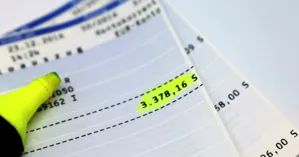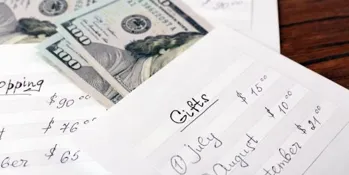- Quick Summary
- Setting Up Your Freelance Business
- Ensure You're Set-Up as an Independent Contractor and Pay Taxes
- Keep a Separate Business Bank Account
- Follow Good Bookkeeping Practices
- Manage Your Freelance Income
- Create an Emergency Fund
- Have a Plan for Health Insurance
- Save for Retirement
- Conclusion

- Quick Summary
- Setting Up Your Freelance Business
- Ensure You're Set-Up as an Independent Contractor and Pay Taxes
- Keep a Separate Business Bank Account
- Follow Good Bookkeeping Practices
- Manage Your Freelance Income
- Create an Emergency Fund
- Have a Plan for Health Insurance
- Save for Retirement
- Conclusion
Freelancing on your own is a dream of many people. You don’t have a boss (except maybe your clients), and you can work any hours you want. But whether you’re a writer, photographer or graphic artist, finances are the mundane part of freelancing. You must have your finances in order.
Financial planning is crucial for freelancers to manage income fluctuations and budget accordingly, ensuring long-term financial health through strategic planning and saving techniques.
Here’s a guide on how to manage finances as a freelancer.
Setting Up Your Freelance Business

As a freelancer, setting up your business is a crucial step in managing your finances effectively. This section will guide you through the process of determining your business structure and establishing your rate.
Determine Your Freelancing Business Structure: LLC Or Sole Proprietorship
When starting your freelance business, you need to decide on a business structure that suits your needs. The two most common structures for freelancers are Limited Liability Corporation (LLC) and Sole Proprietorship.
- LLC: An LLC provides personal liability protection, which means your personal assets are protected in case your business is sued. It also offers tax benefits and flexibility in ownership structure. However, it requires more paperwork and formalities than a sole proprietorship.
- Sole Proprietorship: A sole proprietorship is an unregistered, unincorporated business run by one proprietor. It’s easy to set up and requires minimal paperwork, but it doesn’t provide personal liability protection.
Consider consulting with an accountant or lawyer to determine which structure is best for your business.
Establish Your Rate
Establishing your rate is a critical step in managing your freelance income. Your rate should be based on your industry standards, skills, and expenses. Here are some tips to help you establish your rate:
- Research Industry Standards: Look at what other freelancers in your industry are charging for similar services.
- Calculate Your Expenses: Consider your business expenses, such as equipment, software, and travel costs.
- Determine Your Desired Income: Calculate how much you want to earn per hour or project.
- Consider Your Expertise: If you have specialized skills or experience, you may be able to charge a higher rate.
Ensure You're Set-Up as an Independent Contractor and Pay Taxes

Because you don’t have an employer, you’re responsible for all your taxes.
The employer used to take the taxes out of your pay before you received it, so you didn’t have to worry about paying taxes. That all changed. You’ll need to pay quarterly taxes. If you don’t, you’ll have quite a tax bill at the end of the year: figure 20 percent of your gross pay.
It is crucial to set aside a portion of your income regularly to cover your quarterly tax payments.
To determine what you should pay, estimate your expected tax liability and divide it up into four payments. But talk to an accountant; you should be able to reduce your tax liability through deductions.
Social Security and Medicare
Your employer also paid part of your Social Security and Medicare (FICA) taxes. Now you must pay for it. You won't receive benefits later in life if you don't pay your Social Security taxes.
The Social Security rate is 12.4 percent, up to $168,600 of your net earnings, and the Medicare tax rate is 2.9 percent.
For Social Security, you only have to pay until you eawrn more than 40 credits or ten years of work. Medicare must always be paid monthly.
Keep a Separate Business Bank Account

Keeping separate business bank accounts will save you a lot of headaches. This is especially true around tax time. Remember, this is a business; you should treat it as one.
If a client wants to direct deposit your pay, you don’t want to give out your personal account. You also don’t want to draw business expenses out of your personal account. It will be difficult to deduct them during tax time.
Consider paying yourself out of your business account weekly, bi-weekly, monthly, or whatever works for you. That way, you can track your money.
Pay your taxes out of your business account as well.
You’ll want to have an employee identification number (EIN) to help keep your business accounts separate. You can get one from the IRS for free. You can apply as a sole proprietor (individual) or if you’re set up, as a limited liability company (LLC).
Follow Good Bookkeeping Practices

This is the part that gets many freelancers in trouble. We highly recommend that you use accounting software. Quickbooks works very well for freelancers and costs as low as $17 monthly. It’s easy to use and can save you a lot of work.
It's crucial to manage your personal finance separately from your business finance to effectively track both personal expenses like groceries and business-related costs.
Some people like to use an Excel spreadsheet. Whatever works for you, as long as you have a bookkeeping process.
We like software like Quickbooks because it is automated and will:
- invoice and & accept payments
- track income & expenses
- manage cash flow
- run reports
- provides live expert tax help
- 1099 management (for subcontractors)
But there are other accounting software available. Do the research and find one that works for you.
This leads up to another important financial task, invoicing
Professional Invoicing
You can't just email your client your billing hours and charges. You need to provide them with a proper invoice that they can use in their records. They have tax deductions, too, and your cost is probably one of them.
Always have a professional invoice. It should have a:
- date issued
- invoice number
- work performed
- hours (if applicable)
- client’s purchasing order number (if applicable)
There are various software that will invoice for you. Many have free trials so you can try it out. Some software will track when the invoice is paid and send a friendly reminder at the 30-day mark.
Establish a Budget
Establish how much you want your yearly revenue to be every year, then determine how much you need to make every month to make that goal.
Figure out what your monthly expenses are going to be. Do you need to adjust your income? Can you do it?
Your expenses cannot exceed your yearly income, or you'll be in the red and will not make any money. The ideal scenario is to keep your expenses lower than 30 percent. Any higher, and you are in trouble.
Track Income and Expenses
You must track your business expenses so that you can submit them to the client on a timely basis. That way, you’ll be paid quicker. And those expenses that don’t go to the client must be tracked for tax purposes. You’ll use this information to determine your profit. Some expenses may include:
- office supplies
- travel
- advertising
- meals & entertainment
- subcontractor costs
It is also crucial to set aside funds for tax payments. As a freelancer, you need to prepare for quarterly tax payments and the annual return since taxes are not automatically deducted from your income.
If you let your expenses get out of control and you don’t have enough to pay them, you can get in a mess real fast.
Tracking your income will help you know where you stand and how much you can pay yourself. It will also let you see what expenses you must pay that can’t be passed along to the client.
Your income and expenses must align with your budget.
Manage Your Freelance Income

Managing your freelance income is crucial to ensuring financial stability. This section will guide you through the process of managing your cash flow and separating your personal and business expenses.
Managing Cash Flow
As a freelancer, your income may be irregular, and managing your cash flow is essential to ensuring you have enough money to cover your expenses. Here are some tips to help you manage your cash flow:
- Create a Budget: Track your income and expenses to create a budget that works for you.
- Set Aside Money for Taxes: As a freelancer, you’re responsible for paying your own taxes, so make sure to set aside money for tax season.
- Use a Separate Business Bank Account: Keep your personal and business expenses separate by using a separate business bank account.
- Plan for Unexpected Expenses: Set aside money for unexpected expenses, such as equipment repairs or software updates.
By following these tips, you can manage your cash flow effectively and ensure financial stability as a freelancer.
Create an Emergency Fund

When you're a one-person shop, everything depends on you. If something were to happen to you, how would you live? You need a buffer between you and catastrophe.
Even if nothing happens to you physically or mentally, what if you computer goes down or you have an expensive car repair? Having an emergency fund will get you through those kinds of setbacks.
Figure out your monthly expenses for the next six months, and then sock that amount of money in a high-yield savings account. Many online banks have high-yield accounts.
Establishing an emergency fund doesn't have to be a hardship. Put a little money away each week. So, go without takeout a couple of times a week, or eliminate that dinner out and put that money in your emergency savings account.
Have a Plan for Health Insurance

The best way to set yourself up for disaster is not to have health insurance. If you’re young, you may think you’re invincible, but you’re not.
Contact the Health Insurance Marketplace and take advantage of the Affordable Care Act. Sign up for health insurance; it's probably less expensive than you think.
Save for Retirement

This may seem far off, but saving for retirement through an individual retirement account should be on your mind, even if you’re in your 20s. Besides, a retirement plan may help your tax situation.
There are several plans to choose from. They include:
- Traditional or Roth IRA (can roll a former 401 (k) into it)
- Solo 401 (k) (works like a 401 (k) plan, contributions pre-taxed)
- SEP IRA (some contributions tax-deductible)
Talk to a financial advisor and learn what plan would work for your situation. Some of them have tax advantages.
Conclusion
Don't ignore your finances. As a freelancer, you will have money coming in, and it should be accounted for. You'll also want to ensure that you are invoicing on a timely basis. Watch your finances, and don't let anything fall through the cracks.





